Sep 26, 2020 - Health
Study: Fewer than 10% of Americans have coronavirus antibodies
Add Axios as your preferred source to
see more of our stories on Google.

Illustration: Sarah Grillo/Axios
Add Axios as your preferred source to
see more of our stories on Google.

Illustration: Sarah Grillo/Axios